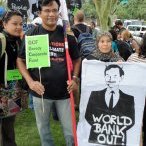
5 January 2012 | Videos | Resisting neoliberalism | Climate Justice and Energy
The Destructive Role of Developed Countries
The United States and the World Bank at the “anti-democratic” UN negotiations
Download: MP3 (714 kb)
The US plays a destructive role at the United Nations climate negotiations. It gives a number of countries an excuse for not doing anything or for being problematic, said Friends of the Earth US campaigner Karen Orenstein in interview with Real World Radio.
She also warned about the future of the Green Climate Fund, which as it is written now it would facilitate the private sector’s access to the fund. She also spoke about the “fights” that are ahead of us to decide whether the World Bank will manage the fund or not. She finally admitted that working within the United Nations Framework Convention on Climate Change is “incredibly frustrating”.
Real World Radio interviewed Orenstein before the end of COP 17 of the UN Convention on Climate Change held in Durban, South Africa.
The event ended last December 11th. She began by describing the US role in the negotiations as “destructive”. She said the country “does not want anything about greenhouse gas reductions to be decided here, they don’t want any money to be delivered to the countries most affected by climate change, and they don’t want other countries to take more ambitious actions.
The US behaviour, one of the main responsible for climate change, is being used by many other developed countries to escape their own commitments, such is the case of Canada, Australia, Japan and the European Union, which promotes itself as “progressive” in the fight against climate change. “Because of what the US does it allows them to look progressive even though they are not”, she said. She also questioned the actions of world powerful countries who hide behind the negative role of the US.
Karen has been following climate finance at the UN climate negotiations for several years now. The Green Climate Fund, created at the COP 16 in Cancun, Mexico, in December 2010 is still developing and it is one of the main issues being currently discussed. The aim of the fund is to provide money to developing countries for adaptation and mitigation to climate change.
“We need a Green Climate Fund. The idea of that is good. The idea is the provision of money for developing countries to address adaptation and mitigation” said Orenstein. The problem is that the process is being corrupted and how it’s designed”.
On December the 1st over 160 civil society organizations of 39 countries issued a letter at the COP 17 in Durban, to expose the developed countries, especially the US, the UK and Japan, for pressuring for transnational corporations and financial institutions to have direct access to the Green Climate Fund.
Orenstein explained that the current Green Fund is a pipeline for developed countries to “subsidize” many multinational corporations. “the way it’s written right now, the US government could give a loan guarantee to Exxon Mobil to build a wind farm in Mexico that services Walmart. And that would count as the US climate finance contribution. We are working really hard to try to change that”, she emphasized.
Tens of social movements and organizations from around the world follow closely the development and design of the Green Climate Fund and they are especially concerned about the role that the World Bank is playing and could play. The Bank is the fund’s interim trustee and it is part of the technical unit that helps design it. Orenstein said that working to prevent that the World Bank ends up becoming the fund’s permanent trustee “will be a fight”, especially when industrialized countries support it.
She said the civil society is working to make sure the process for the election of the Fund’s permanent trustee is transparent.
At the end of the interview she admitted “I expected to be disappointed” by the UN Climate Cop and said these conferences are good to “limit the damage” but not to provide solutions to climate change. “The solutions are going to come from outside this space. The UNFCCC process itself is an incredibly frustrating space to work in because civil society is totally marginalized (...) It is untransparent and a very undemocratic space to work in”.







